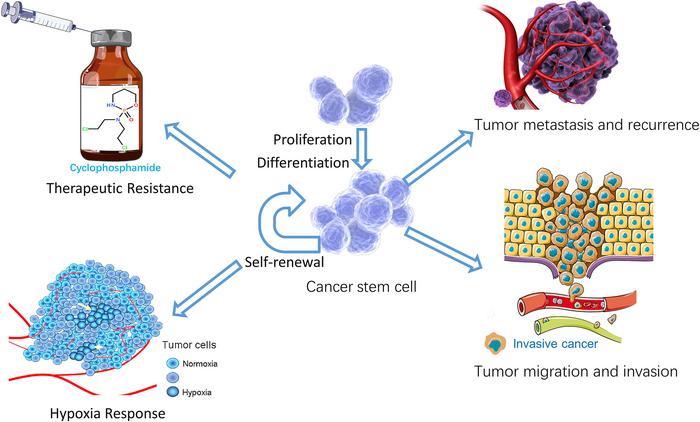In recent years, the understanding of cancer biology has significantly advanced, particularly in the context of cancer stem cells (CSCs). These cells are believed to be integral to tumor development, metastasis, and recurrence. A new review published in the journal “Genes & Diseases” delves deeply into the role of ubiquitination—a vital protein modification mechanism—in regulating the functionalities of CSCs. This insight could open new avenues for therapeutic interventions aimed at the underlying mechanisms of tumor progression.
Ubiquitination is a post-translational modification that marks proteins for degradation, a process critical for cellular homeostasis. The review highlights the importance of the ubiquitin-proteasome system (UPS) in CSCs, elucidating how dysregulation in this system has been linked to tumorigenesis. Understanding these connections sheds light on potential targets for innovative cancer therapies. The intricate interplay between ubiquitination and cancer stem cell biology may reveal vulnerabilities that could be exploited in the fight against malignancies.
The role of E3 ubiquitin ligases, the enzymes responsible for tagging proteins with ubiquitin for degradation, is also discussed. These ligases selectively target proteins that are pivotal in CSC survival and function. By modulating the activity of these ligases, researchers hope to influence the stability of CSC-associated proteins, thereby impacting the self-renewal and differentiation capabilities of CSCs. This novel perspective suggests that through careful manipulation of the ubiquitination landscape, scientists can develop effective strategies to combat cancer.
Deubiquitinases, which counteract the function of ubiquitin ligases, are equally significant in the context of CSCs. The review outlines how these enzymes not only prevent the degradation of crucial proteins but also actively participate in the signaling cascades that dictate stem-like properties in cancer cells. This dual role introduces a complex regulatory dance that determines the fate of CSCs. Disrupting this balance could lead to a loss of stemness, making CSCs more susceptible to conventional therapies.
As scientific inquiries into the regulation of CSCs expand, the implications for cancer therapies become increasingly apparent. The potential for developing E3 ligase-targeting drugs is highlighted as an innovative avenue, with existing proteasome inhibitors like bortezomib already demonstrating efficacy in certain cancer types. This lays the groundwork for a new class of targeted treatments that can be combined with existing chemotherapy or immunotherapy protocols.
The significance of combinatorial therapies is a key focal point in this discussion. By integrating Ub-targeted therapies with established treatment modalities, there is substantial promise for enhancing patient outcomes. The synergistic effects of such combinations could lead to more robust responses in treatment-resistant cancers, which often harbor CSCs responsible for relapse.
Furthermore, the review emphasizes the necessity for ongoing investigation into both E3 ligases and deubiquitinases. Since the landscape of ubiquitination is vast and complex, precise characterization of these enzymes could yield significant breakthroughs in oncology. With a better grasp of how ubiquitin system modulations can affect CSC behavior, researchers can tailor medications that are both effective and highly targeted, minimizing the collateral damage associated with conventional cancer therapies.
Importantly, this article does not merely present findings; it also discusses broader implications for the field of cancer research. The integration of molecular-level insights with clinical applications demonstrates a progressive shift towards more personalized medicine approaches. As researchers continue to identify the regulatory factors governing CSCs through ubiquitination, there is hope for refining strategies against cancer recurrence and treatment resistance.
As we reflect on the increasing sophistication of molecular oncology, the insights provided by the review in “Genes & Diseases” represent a promising shift in our approach to tackling one of the most challenging aspects of cancer treatment. The potential to not only prolong life but improve its quality through focused therapies stemming from a deep understanding of CSCs is an exciting frontier in medical science.
With each step forward in research, the dream of achieving better, more effective therapies becomes a tangible reality. The pathways outlined in the recent review signal a call to action for researchers and clinicians alike—a reminder that a collaborative and holistic approach is essential in the relentless quest to outsmart cancer.
In conclusion, the exploration of ubiquitination’s role in CSC functionality encapsulates a critical dimension of contemporary cancer research. Continued advancement in this area not only enlightens our understanding of cancer dynamics but also equips us with the necessary tools to confront the multifaceted nature of malignancies in the future.
Subject of Research: The role of ubiquitination in cancer stem cell regulation.
Article Title: Key Roles of Ubiquitination in Regulating Critical Regulators of Cancer Stem Cell Functionality.
News Publication Date: October 2023.
Web References: Genes & Diseases Journal
References: Qianqian Guo, Hai Qin, Zelong Chen, Wenzhou Zhang, Lufeng Zheng, Tingting Qin, Key roles of ubiquitination in regulating critical regulators of cancer stem cell functionality, Genes & Diseases, Volume 12, Issue 3, 2025, 101311.
Image Credits: Genes & Diseases.
Keywords: Cancer stem cells, ubiquitination, E3 ubiquitin ligases, deubiquitinases, therapeutic targets, tumor progression, drug resistance.
Tags: cancer stem cell regulationcellular homeostasis and cancerCSCs and tumor metastasisdysregulation of protein modificationE3 ubiquitin ligases in cancerinnovative cancer therapiesmechanisms of tumor progressionpost-translational modifications in cancertargeting cancer stem cell vulnerabilitiestherapeutic interventions for cancerubiquitin-proteasome system and tumorsubiquitination in cancer biology





